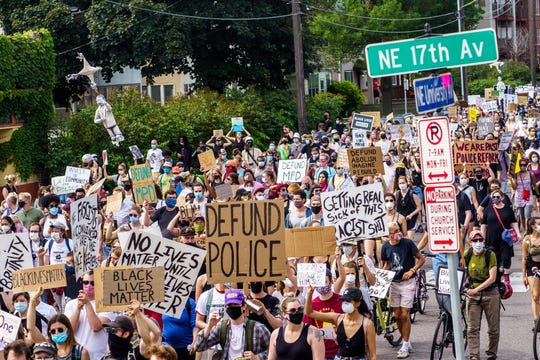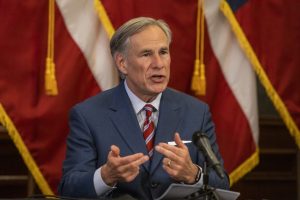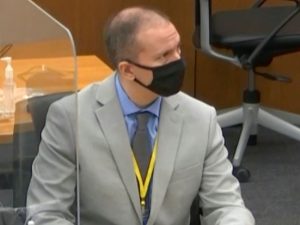As the trial begins for a former police officer accused of killing George Floyd, here’s what you need to know about the case. USA TODAY
Millions of people watched George Floyd take his last breath while pinned under Derek Chauvin’s knee. Tens of thousands of people took to the streets to protest police killings of Black men like him, chanting his last words: “I can’t breathe.” Others criticized looters and responded, “All lives matter.”
Now, lawyers must find 12 people in and around Minneapolis who haven’t made up their minds about what happened.
Chauvin, a former Minneapolis police officer, is charged with second-degree murder and manslaughter. After an appeals court ruling Friday, he could be charged with third-degree murder, too. Three other former cops are charged with aiding and abetting those crimes; they go on trial later this year.
Tuesday morning, lawyers selecting a jury — a painstaking process often dependent on instinct, emotional intelligence and stereotypes over race and class.
Derek Chauvin trial live updates:Jury selection begins Tuesday
Three weeks have been blocked off to find 12 jurors and up to four alternates. “Jury selection is going to be very long,” said Benjamin Crump, the Floyd family attorney. He said he believes “you can get people who will commit to be honest, and that’s all you can ever ask for.”
In the case of Chauvin, who is white, the process is made harder not just by the media attention, but the protests and violence that polarized and traumatized the city.
That’s why Eric Nelson, Chauvin’s defense attorney, requested a change of venue, arguing that media coverage of “riots and looting” was so intense that “the Twin Cities jury pools have surely been tainted and a fair trial cannot be had in the Twin Cities area.”
The judge disagreed and denied his request.
‘You are a potential juror’
In state court, lawyers for the defense and prosecution question prospective jurors. In the Chauvin case, the court sent a 13-page questionnaire to people in the jury pool months ahead of time.
At the top of the document is a stern warning: “From this day forward, DO NOT read or intentionally view anything about these cases or do any investigation or research related to these cases.”
The questionnaire includes sections on media habits, police contacts and opinions on the criminal justice system.
It even asks whether the potential juror has struggled with drug addiction. A toxicology report showed fentanyl and methamphetamine in Floyd’s system, and the defense is likely to argue he died from a drug overdose.
‘Reckless disregard for human life’ or ‘tragic accident’? Derek Chauvin goes on trial, charged with murder of George Floyd.
The questionnaire asks jurors if they or someone close to them participated in “any of the demonstrations or marches against police brutality.” If so, did they “carry a sign? What did it say?”
Other questions include whether the potential jurors, or someone they know, were injured or suffered property damage during the protests.
In bold, it says: “No matter what you have heard or seen about this case, and no matter what opinions you might have formed, can you put all of that aside and decide this case only on the evidence you receive in court, follow the law, and decide the case in a fair and impartial manner?”
On Monday, attorneys struck 16 potential jurors from the pool based solely on their answers to the questionnaire.
What will the jury look like?
Miriam Krinsky, a former federal prosecutor who heads the legal reform nonprofit Fair and Just Prosecution, said the aim in any trial isn’t for a jury that knows nothing about the case, but rather a jury willing to be fair.
Many questions of potential jurors, she said, are a cover for race-based decisions. For example, questions regarding bad experiences with law enforcement “too often lead to eliminating jurors of color in over-policed communities,” she said.
Some community advocates in Minneapolis are concerned about the racial composition of the jury, said Sarah Davis, executive director at the nonprofit Legal Rights Center in Minneapolis.
Hennepin County, where Minneapolis is located, is mostly white, and so are its juries.
And then there’s the length of the trial, the need to sequester during deliberations — and perhaps longer — and the ongoing coronavirus pandemic, with the challenges it brings for schooling and child care. The Black community has been disproportionately hit by COVID-19.
Minneapolis public school students in elementary grades are doing a hybrid of in-person and distance learning. while older students are doing distance learning.
Jurors must take time off work for up to four weeks, during which time their employers are not required to pay them. The court will pay jurors $20 a day, plus a mileage reimbursement.
“I think the likelihood of having a racially diverse jury is slim to none,” Davis said. “We have to go into it just knowing that that’s the case. And I think each side is looking for jurors that are going to be more inclined to side with them.”
Can jurors forget what they saw?
Floyd took his last breaths as he lay handcuffed on the ground, pinned beneath Chauvin’s knee for 9 1/2 minutes. The incident, caught on video by bystanders, was seen around the world and sparked discussions and protests over racial privilege and police brutality.
Marvyn Kornberg, a prominent New York City criminal defense lawyer, is no stranger to high-profile cases. He represented Justin Volpe, a New York Police Department officer accused of anally sodomizing a handcuffed Haitian immigrant with a stick in a police precinct restroom in 1997.
Kornberg said it would be extremely difficult to find a potential juror who was unaware of the allegations against Chauvin.
“If you get a guy who says he doesn’t know anything about anything in that case, you have to ask if he was on Mars when it happened,” said Kornberg, who has no connection to the Chauvin trial.
Kornberg recommended looking for a juror who has an open mind: “Can you forget what they saw on TV and focus just on what you see and hear in this trial?”
He suggested lawyers do a little psychological jiujitsu on prospective jurors, asking things like, “Am I wasting my time picking you as a juror? … You saw this, you heard all about this. Tell me why I should pick you as a juror? Can you have an open mind?”
Lawyers ‘want to get at what they’re thinking’
Besides trying to ferret out biases, lawyers can take the opportunity to make a connection, educate and even ingratiate themselves with the people who will decide the case, said Joseph Daly, emeritus professor at Mitchell Hamline School of Law.
Daly said he has sometimes decided on a juror based on the infamous presidential candidate test: whether he would have a beer with the person. “If the answer is yes, it means somehow, I know I can connect with this juror,” Daly said.
In another well-known case, New York City criminal defense lawyer Benjamin Brafman defended Martin Shkreli. He’s best known as the so-called “Pharma Bro” who drove a 5000% price hike on a drug used by immunocompromised patients like those with HIV or cancer. Shkreli was tried and convicted on unrelated charges of securities fraud.
Brafman, who has no connection to the Chauvin trial, recommended lawyers subtly challenge potential jurors, asking things like, “Do you have the courage to acquit if you feel an acquittal is required under the law? Do you feel you can go back into your community, your neighborhood, your family if you’ve made a decision that might not be popular?”
Brafman said criminal defense lawyers in difficult cases typically will try to tease out the true feelings of potential jurors by asking open-ended questions and following up. “You want to get at what they’re thinking,” he said.
In a big case, deep-pocketed clients may agree to hire an investigator to research the backgrounds of potential jurors and examine their social media activity for bias.
Daly remembers one time when he was working as a defense attorney and he spoke with a potential juror about her ballet background. After some back-and-forth, the prosecutor passed him a note: “Are you voir-dire-ing her? Or are you trying to date her?”
The prosecutor decided to challenge that woman’s participation on the jury without asking her a single question, Daly said — simply because he believed Daly and the woman had made a connection.
If attorneys find a reason to eliminate a juror, the judge must approve that reason. Otherwise, lawyers can use what’s known as a “peremptory challenge” to cut someone without providing a reason.
The defense will have 15 peremptory challenges in the Chauvin case and the prosecution will have nine, said Mary Moriarty, former Hennepin County chief public defender.
Coronavirus, security concerns could shape courtroom dynamic
The COVID-19 pandemic will change the dynamic in the courtroom. Public access has been severely limited to enable social distancing. Jurors won’t sit in the jury box, but will be spread throughout the public seating area.
For their safety, jurors will not be named during the trial, though their names may be made public afterward.
“The entire courthouse is shut down, and the courthouse is surrounded by fencing and barbed wire and concrete barricades. I know some of the impact that’s having on the community; I do wonder what impact that has on a potential jury,” Moriarty said. “I wonder if that will make them fearful for any reason.”
Follow USA TODAY National Correspondent Tami Abdollah, who is covering the Chauvin trial, at twitter.com/latams.



















